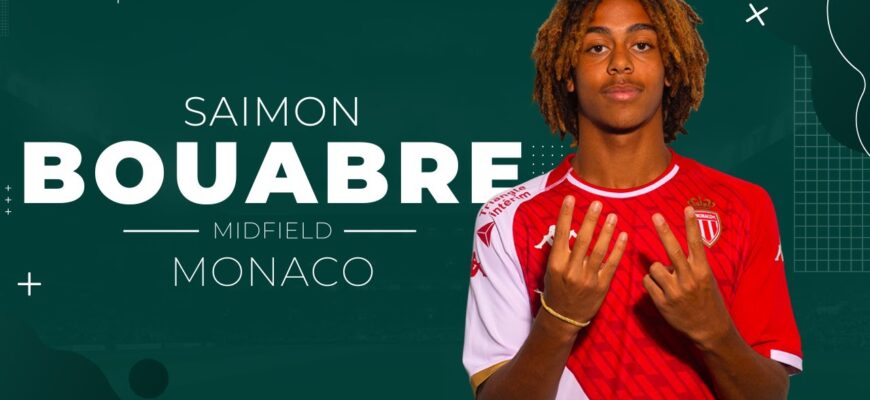In the high-stakes world of professional football, where young talent is perpetually scouted, nurtured, and often ruthlessly discarded, the narrative of a promising player making a surprising move can captivate. Such is the story of Saimon Bouabré, the 19-year-old France youth international, whose recent transfer from the opulent confines of AS Monaco to the burgeoning landscape of Neom SC in the Saudi Pro League sent a ripple through the transfer market. Worth a cool €10 million, this wasn`t merely a transaction; it was a statement. But what truly motivated this precocious forward to trade European football’s established pathways for the Arabian Peninsula?
The Monaco Conundrum: Promise vs. Playing Time
Bouabré arrived at Monaco with considerable hype, a testament to his abilities during his formative years. Yet, as many young players discover, bridging the gap from youth academy prodigy to senior team regular at a top-tier European club is a chasm rather than a step. Despite his obvious talent, consistent first-team minutes at the Principality club proved elusive. This scarcity of game time became the crucible for a growing discontent, culminating in a standoff as his contract neared its final year.
Monaco`s CEO, Thiago Scuro, articulated the club`s position with a certain bluntness, reflecting the pragmatic, performance-driven ethos of modern football:
“He needs to show that he deserves anything from the club. The intention was to have him here for pre-season… He didn’t play at the level we expected. First, it is about the sporting requirements to be a Monaco player.”
Such remarks, while perhaps intended to motivate, often sound to a young player like a challenge they`re eager to take up elsewhere, especially when immediate opportunities are scarce.
The U21 Euro Snub: A Point of Contention
The tension between player and club escalated further with the contentious issue of the Euro U21 Championships. Bouabré, keen to represent his nation on a significant stage, found his participation vetoed by AS Monaco. While clubs technically held the right to prevent players from joining tournaments falling outside the official FIFA calendar – a point Scuro highlighted – the optics were less than ideal. This decision, seemingly a power play to ensure the player`s presence for pre-season, might have inadvertently solidified Bouabré`s resolve to seek greener pastures.
Curiously, he was permitted to participate in the Maurice-Revello competition, which *did* align with the FIFA calendar. This distinction, while technically correct, underscored the club`s selective approach, reinforcing the perception of a relationship under strain.
The Neom Proposition: Galtier`s Guarantee
Enter Neom SC and their manager, Christophe Galtier. The former Lille and PSG boss, no stranger to winning Ligue 1 titles, offered Bouabré something more concrete than abstract “sporting requirements” or future promises: a guarantee of game time. For a young player whose primary currency is minutes on the pitch, this offer was invaluable.
Bouabré himself explained his decision with refreshing candour:
“It was game time that I was looking for at another club… It was Christophe Galtier who guaranteed me the most minutes. My talks with him were fluid, convincing. I didn’t have a lot of game time [at Monaco] and that was what I was looking for. He said I would play, and that’s what I was looking for. Within reason, the league didn’t matter.”
The phrase “the league didn`t matter” is particularly telling. It speaks volumes about the priorities of modern young footballers. While the allure of top European leagues is undeniable, the practical need for consistent development through actual match experience often outweighs the prestige of merely being associated with a prominent club, especially from the bench.
Beyond the Surface: Implications for Player Development and Global Football
Bouabré`s transfer isn`t just an isolated incident; it`s a microcosm of broader trends shaping the global football landscape. For clubs like AS Monaco, the challenge lies in balancing the development of their youth assets with the immediate demands of elite competition. Promising talents require a clear pathway, and when that path is obstructed, they will inevitably look elsewhere.
For players, the choice becomes a pragmatic calculation: is it better to compete for limited minutes at a Champions League-level club, or to be a key player in a developing league, even if it`s outside Europe`s traditional powerhouses? The Saudi Pro League, with its significant financial backing and increasing ambition, is rapidly becoming a viable alternative. While the “gold rush” narrative often focuses on seasoned veterans seeking lucrative twilight careers, Bouabré`s move highlights its growing appeal even for young players prioritising playing time.
This raises an interesting question about the quality of development. Can playing consistently in the Saudi Pro League offer the same rigorous challenges and growth opportunities as, say, a loan spell in a competitive European league? Only time will tell, but for Bouabré, the decision was clear: regular football now is paramount.
Saimon Bouabré`s departure from AS Monaco to Neom SC is a testament to the evolving priorities in professional football. It underscores the critical importance of game time for young talents and the growing influence of non-traditional leagues capable of offering compelling packages – both in terms of minutes and, let`s be honest, often financial incentives, even if Bouabré chose to emphasize the former. His “league didn`t matter” stance, while perhaps a convenient narrative for a player of his age, encapsulates a generation of footballers willing to forge their own paths, wherever that may lead. Whether this bold move will propel him to the heights once envisioned remains to be seen, but one thing is certain: Saimon Bouabré chose to play his way, and that`s a decision many can understand, even if few might have predicted its destination.








